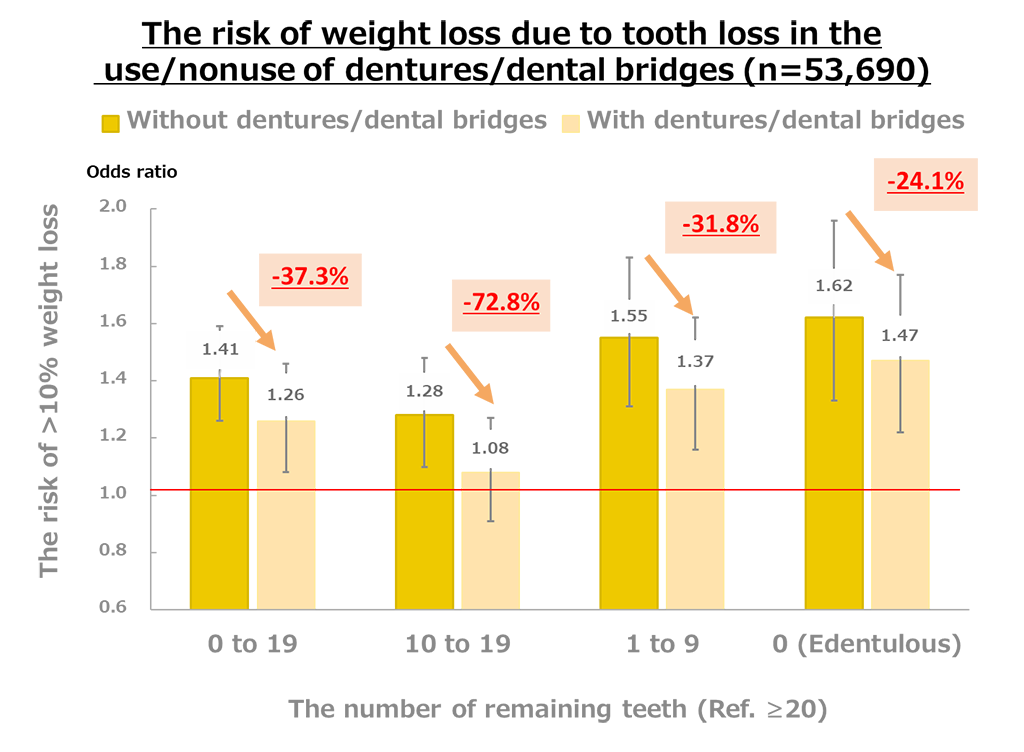Weight loss in older adults is associated with an elevated risk of mortality based on the outcomes of previous studies. The oral cavity is closely related to nutritional intake due to its role in mastication (chewing), and loss of teeth leads to deterioration in masticatory function. Therefore, in dentistry, oral function is restored with prosthetic dental treatments such as dentures and bridges. Decreased oral function due to tooth loss is thought to affect nutritional status. However, it has not been determined whether prosthetic treatment, such as dentures or bridges, mitigates the effects of tooth loss on nutritional status. A research group consisting of Professor Jun Aida of Tokyo Medical and Dental University Graduate School of Medicine and Assistant Professor Taro Kusama of Tohoku University Graduate School of Dentistry clarified whether the relationship between number of teeth and weight loss of 10% or more over a 3-year period varied depending on the use of dentures and bridges in approximately 53,000 elderly community members aged 65 and over.
The results revealed that the risk of weight loss was approximately 1.41 times higher in people with 19 or fewer teeth than in people with 20 or more teeth without dentures and bridges. However, the risk was only approximately 1.26 times higher in patients with dentures and bridges, and it was also found that using these treatments reduced the risk of weight loss by approximately 37% in people with 19 or fewer teeth. The researchers also conducted a follow-up study on the occurrence of ≥10% weight loss over 3 years among older adults aged ≥65 years who were not certified as requiring long-term care and who participated in the JAGES (Japanese Gerontological Study) survey conducted from 2010-2013.
According to the European Society for Clinical Nutrition and Metabolism, weight loss of ≥10% is one of the indicators of malnutrition in the elderly. The number of teeth was compared under two categories as follows: "20 or more" or "19 or less". In addition, "19 or less" was further subdivided into "10 to 19", "1 to 9", and "0" for additional comparisons. The analysis removed effects such as sex, age, educational history, equivalent income, smoking history, comorbidities (cancer, stroke, diabetes), and body mass index at 10-year follow-up. The risk of weight loss in patients with "19 or less" teeth compared to those with "20 or more" teeth was calculated for presence or absence of dentures / bridges. The risks calculated in the study represent "the risk of weight loss when dentures and bridges were used when the number of teeth was small" and "the risk of weight loss when dentures and bridges were not used where the number of teeth was small".
The survey showed that 5.8% of the 53690 subjects lost more than 10% of their body weight during the 3-year follow-up period. Overall, 4.3% of people with 20 or more teeth and 6.8% of those with 19 or less teeth lost 10% or more of their weight. Results of a causal mediation analysis showed that the risk of weight loss of 10% or more in people with 19 or less teeth was approximately 1.41 times higher than that in those without dentures / bridges. When using dentures / bridges, the risk increased by approximately 1.26 times, and the risk of weight loss was reduced by approximately 37.3% in people who used dentures / bridges even when the number of teeth was 19 or less. In addition, people with 10-19 teeth had a 1.08-fold risk of weight loss when using dentures and bridges, which was not statistically significantly different from that of those with 20 or more teeth.
The current study is the first to quantitatively clarify the long-term effects of prosthetic treatment on the maintenance of general health in elderly people who have lost their teeth by using a causal mediation analysis. Having more natural teeth throughout life is important for maintaining and improving health, but the findings show that that even in people who have lost their teeth, proper prosthetic treatment such as dentures and bridges can help to mitigate the effects of tooth loss on general health.

Credit: Tokyo Medical and Dental University, Tohoku University. DOI: Kusama, T., Umehara, N., Kiuchi, S., Kondo, K., Osaka, K., Aida, J. Dental Prosthetic Treatment Reduced the Risk of Weight Loss among Older Adults with Tooth Loss. J. Am. Geriatr. Soc. (adv. pub.). (2021)
This article has been translated by JST with permission from The Science News Ltd.(https://sci-news.co.jp/). Unauthorized reproduction of the article and photographs is prohibited.




